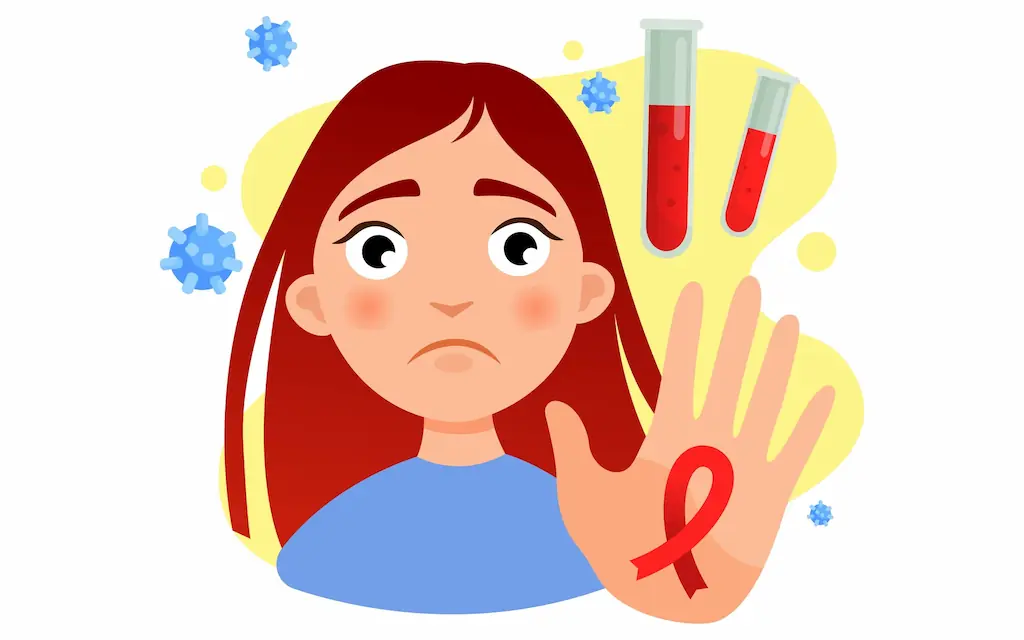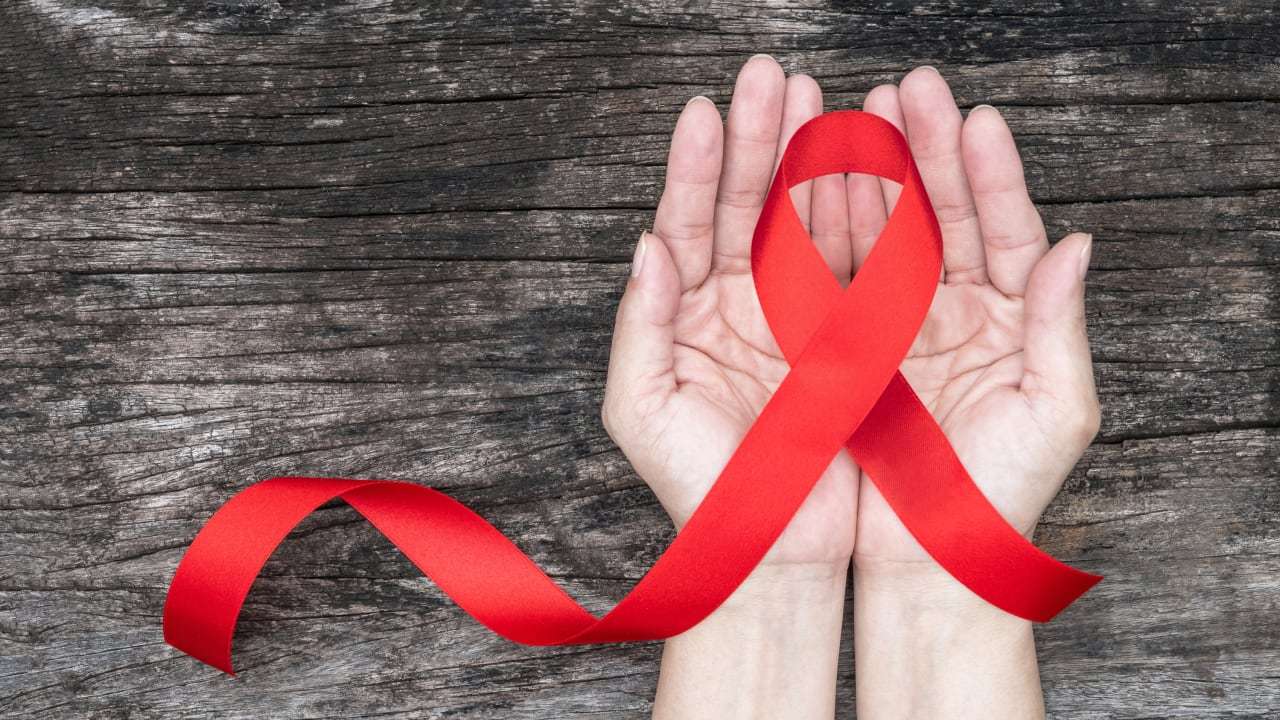
We’re exploring the links between mental health and sexual health. In this blog, Ellie Harrison, a Positive Voices speaker for the Terrence Higgins Trust, shares her tips for managing your mental health following a positive HIV diagnosis.
When I was diagnosed with HIV in 2018 it was a distressing time.
I knew nothing about HIV – my only knowledge of it was when Ste was diagnosed in Hollyoaks. The one thing that kept me going was the thought that Ste got HIV ages ago and was still in the show. Maybe I’d be OK too?
I’d assumed my treatment plan would be massive but that wasn’t the case. The nurse told me I just needed to take one pill a day, which reduces the level of HIV in my body to an undetectable level, meaning it’s impossible to pass the virus on to anyone else.
I live a completely normal life – the only change is that one pill. Thanks to incredible progress around HIV, people like me can live fulfilling lives that are just as long (if not longer!) than those who are HIV-negative. However, an HIV diagnosis can take a huge toll on your mental health because of the stigma associated with it.
In fact, today, the stigma around HIV does more damage than the virus itself.
Here are my top tips for managing your mental health following an HIV diagnosis.
- Learn the facts on HIV
If you’ve just been diagnosed with HIV you might be feeling upset, shocked, or angry. You might be having trouble taking in the things you’ve been told – but it’s so important to know that you can now live a long, healthy life with HIV. That includes having children free from HIV.
HIV in no way limits my life, but it can have a devastating psychological impact. You can call Terrence Higgins Trust’s helpline, THT Direct on 0808 802 1221 for immediate support. When I told my mum I was living with HIV, she was on the phone with them for three hours and got all the information she needed, including how to support me and the correct things to say to me.
2. Give yourself time and space to process the news
When I was diagnosed with HIV I did not allow myself time to process and heal properly. I put too much pressure on myself to tell people – looking back I realise that there was no rush. I tried to make myself feel better by going on nights out and getting drunk, telling friends when I wasn’t ready. Thankfully they didn’t react badly, but they didn’t know what to say either. None of us had ever thought HIV would hit our friendship group – a lot of them cried. Negative reactions can hurt, especially when you haven’t come to terms with your HIV diagnosis. You should never feel rushed into sharing your HIV status – take as much time as you need.
3. Talk to other people living with HIV
Finding support from other people living with HIV can be life-changing. Speaking to others who are in the same boat about their experiences and what worked for them helped – it made me realize there was light at the end of the tunnel and that self-acceptance was possible. Later this year, Terrence Higgins Trust is launching My Community, a free online space for anyone living with HIV in the UK to feel supported, connect, share experiences, seek advice, find reliable information, and get involved.
4. Speak to a loved one you trust when you feel ready
Confiding in someone close can be an invaluable source of support although it’s important to know that many people believe incorrect information about HIV and could treat you differently because of it. It might be a good idea to have some information with you when clearing up those misconceptions as not everyone will know what you know. There is no rush to tell others if you don’t feel ready and some people may not feel safe talking about their HIV diagnosis.
The biggest advice I can give to allies is to be kind and considerate. Unless you’re someone living with HIV, you can’t imagine just how petrifying it is to be open about your status. By normalizing conversations about HIV and spreading the word about the progress we’ve made, we can create a safe space for people to talk openly about what it’s like to live with HIV.
5. Take manageable steps to manage your mental health
Depression is twice as common among people living with HIV – one in three will have some symptoms of it at some point in their lives. Struggling with anxiety, self-image, and insomnia is also common.
I try as much as possible to separate my HIV diagnosis from my mental health. I used to put them in the same category but this felt like too much to deal with at once. Taking manageable steps to manage your mental health can help – that includes seeing friends and family members who make you feel loved and cared for, keeping up with social activities even if you don’t feel like it, and joining support groups. Being with others who are also dealing with it can go a long way.
As we mark Sexual Health Week, it’s important to acknowledge the connection between mental and sexual health, especially for those living with HIV. Breaking the stigma surrounding HIV and ensuring that services support mental well-being as well as physical health, means we can support people living with HIV to live long and healthy lives.






Well I sincerely liked reading it. This tip provided by you is very effective for correct planning.
Thank you for the sensible critique. Me & my neighbor were just preparing to do a little research about this. We got a grab a book from our area library but I think I learned more from this post. I’m very glad to see such great information being shared freely out there.
Attractive part of content. I just stumbled upon your weblog and in accession capital to claim that I acquire in fact loved account your blog posts. Anyway I抣l be subscribing on your feeds or even I achievement you get entry to constantly rapidly.
A large percentage of of the things you point out happens to be supprisingly appropriate and it makes me ponder the reason why I hadn’t looked at this in this light before. This piece truly did turn the light on for me as far as this particular topic goes. Nonetheless there is actually one particular factor I am not necessarily too comfy with and while I attempt to reconcile that with the central idea of the position, let me observe what all the rest of your subscribers have to point out.Very well done.
Thank you for another magnificent post. The place else may anyone get that kind of info in such an ideal method of writing? I’ve a presentation subsequent week, and I’m at the look for such info.
Your articles are extremely helpful to me. Please provide more information!
I am really loving the theme/design of your weblog. Do you ever run into any web browser compatibility problems? A number of my blog audience have complained about my website not working correctly in Explorer but looks great in Chrome. Do you have any suggestions to help fix this issue?
I have been absent for some time, but now I remember why I used to love this website. Thanks , I will try and check back more often. How frequently you update your web site?
Thanks for the post, how can I make is so that I get an alert email whenever you publish a fresh post?
I do agree with all of the ideas you’ve presented in your post. They’re very convincing and will certainly work. Still, the posts are too short for beginners. Could you please extend them a little from next time? Thanks for the post.
Heya this is kinda of off topic but I was wondering if blogs use WYSIWYG editors or if you have to manually code with HTML. I’m starting a blog soon but have no coding skills so I wanted to get guidance from someone with experience. Any help would be greatly appreciated!
Thanks for revealing your ideas. Another thing is that scholars have an option between national student loan plus a private education loan where its easier to choose student loan debt consolidation loan than with the federal education loan.
I’ve come across that nowadays, more and more people are attracted to surveillance cameras and the field of picture taking. However, like a photographer, you need to first expend so much period deciding the model of digicam to buy and also moving store to store just so you can buy the cheapest camera of the trademark you have decided to decide on. But it does not end right now there. You also have take into consideration whether you should obtain a digital camera extended warranty. Thx for the good ideas I accumulated from your web site.
I just like the helpful information you supply in your articles. I抣l bookmark your blog and take a look at once more here frequently. I am somewhat certain I will be informed lots of new stuff proper right here! Best of luck for the following!
I like what you guys are up too. Such clever work and reporting! Carry on the excellent works guys I have incorporated you guys to my blogroll. I think it’ll improve the value of my website 🙂
Thanks for your post. What I want to point out is that when evaluating a good online electronics go shopping, look for a site with total information on critical indicators such as the personal privacy statement, basic safety details, any payment methods, and various terms in addition to policies. Continually take time to investigate the help plus FAQ areas to get a much better idea of how a shop works, what they can do for you, and the way you can make use of the features.
I have learn some just right stuff here. Definitely value bookmarking for revisiting. I wonder how so much effort you put to make this type of great informative website.
This actually answered my problem, thank you!
The things i have seen in terms of laptop memory is the fact that there are requirements such as SDRAM, DDR or anything else, that must fit the specs of the motherboard. If the personal computer’s motherboard is kind of current and there are no computer OS issues, changing the memory space literally will take under one hour. It’s on the list of easiest laptop or computer upgrade treatments one can visualize. Thanks for expressing your ideas.
I have figured out some points through your website post. One other thing I would like to mention is that there are lots of games that you can buy which are designed in particular for toddler age youngsters. They consist of pattern recognition, colors, pets, and patterns. These generally focus on familiarization as opposed to memorization. This helps to keep children occupied without having the experience like they are studying. Thanks
Unquestionably believe that which you stated. Your favorite justification appeared to be on the web the easiest thing to be aware of. I say to you, I definitely get annoyed while people think about worries that they plainly do not know about. You managed to hit the nail upon the top and also defined out the whole thing without having side-effects , people could take a signal. Will probably be back to get more. Thanks
Your articles are extremely helpful to me. May I ask for more information? http://www.hairstylesvip.com
Heya i am for the primary time here. I came across this board and I in finding It really useful & it helped me out a lot. I hope to provide something again and help others such as you aided me.
Thank you a lot for providing individuals with a very marvellous possiblity to check tips from this web site. It is usually so sweet and full of a good time for me personally and my office co-workers to search your blog a minimum of 3 times a week to find out the new things you will have. And indeed, I’m just at all times impressed with the eye-popping secrets you serve. Selected 1 points in this posting are in fact the best we have ever had.
Wow! Thank you! I always needed to write on my website something like that. Can I include a fragment of your post to my website?
Greetings! I’ve been reading your blog for some time now and finally got the courage to go ahead and give you a shout out from Huffman Texas! Just wanted to say keep up the fantastic work!
some times its a pain in the ass to read what blog owners wrote but this internet site is very user friendly! .
Thanks for expressing your ideas. The one thing is that individuals have an alternative between government student loan and also a private student loan where it is easier to go with student loan debt consolidation loan than with the federal student loan.
Magnificent beat ! I wish to apprentice even as you amend your web site, how could i subscribe for a weblog website? The account aided me a appropriate deal. I were a little bit acquainted of this your broadcast provided bright transparent concept
After study just a few of the weblog posts on your web site now, and I really like your method of blogging. I bookmarked it to my bookmark web site checklist and shall be checking again soon. Pls try my site as effectively and let me know what you think.
Thanks for the recommendations shared on your blog. Something else I would like to say is that fat loss is not all about going on a dietary fad and trying to get rid of as much weight as possible in a few days. The most effective way to burn fat is by taking it gradually and following some basic ideas which can provide help to make the most through your attempt to shed pounds. You may be aware and be following these tips, although reinforcing knowledge never does any damage.
I just couldn’t depart your site prior to suggesting that I really enjoyed the standard info a person provide for your visitors? Is going to be back often to check up on new posts
I learned more interesting things on this weight loss issue. One particular issue is that good nutrition is tremendously vital when dieting. A big reduction in junk food, sugary ingredients, fried foods, sugary foods, pork, and white flour products could possibly be necessary. Keeping wastes bloodsuckers, and wastes may prevent goals for shedding fat. While specified drugs in the short term solve the condition, the bad side effects aren’t worth it, plus they never present more than a temporary solution. It is just a known proven fact that 95 of fad diet plans fail. Thanks for sharing your ideas on this blog site.
Please let me know if you’re looking for a article author for your site. You have some really great articles and I feel I would be a good asset. If you ever want to take some of the load off, I’d absolutely love to write some articles for your blog in exchange for a link back to mine. Please blast me an email if interested. Cheers!
Do you mind if I quote a couple of your posts as long as I provide credit and sources back to your blog? My blog is in the exact same area of interest as yours and my visitors would genuinely benefit from some of the information you present here. Please let me know if this okay with you. Thanks a lot!
Fantastic beat ! I wish to apprentice while you amend your site, how could i subscribe for a blog web site? The account aided me a acceptable deal. I had been tiny bit acquainted of this your broadcast provided bright clear concept
Hi, i think that i saw you visited my weblog so i got here to 搟go back the desire?I am attempting to in finding things to improve my web site!I suppose its good enough to make use of a few of your ideas!!
I have observed that of all kinds of insurance, health care insurance is the most dubious because of the clash between the insurance coverage company’s obligation to remain profitable and the consumer’s need to have insurance coverage. Insurance companies’ earnings on health plans are extremely low, thus some providers struggle to gain profits. Thanks for the thoughts you discuss through this blog.
I discovered your blog site on google and test a number of of your early posts. Continue to maintain up the excellent operate. I just further up your RSS feed to my MSN News Reader. Seeking ahead to studying more from you in a while!?
I’m also commenting to make you be aware of what a extraordinary experience my wife’s girl obtained reading through your webblog. She mastered numerous things, which included what it is like to possess an ideal giving character to make many more without hassle learn certain complicated issues. You really did more than people’s expected results. Thank you for showing the valuable, dependable, edifying as well as easy tips on that topic to Emily.
There are actually a variety of particulars like that to take into consideration. That could be a great point to bring up. I provide the ideas above as common inspiration but clearly there are questions just like the one you deliver up where crucial factor will likely be working in sincere good faith. I don?t know if best practices have emerged round things like that, however I am sure that your job is clearly recognized as a fair game. Each girls and boys feel the impression of only a moment抯 pleasure, for the rest of their lives.
Thanks for this excellent article. Also a thing is that the majority of digital cameras can come equipped with the zoom lens so that more or less of any scene being included simply by ‘zooming’ in and out. Most of these changes in target length are generally reflected from the viewfinder and on large display screen at the back of the exact camera.
Wow! Thank you! I continually wanted to write on my blog something like that. Can I include a part of your post to my site?
Hi! This is my first visit to your blog! We are a collection of volunteers and starting a new initiative in a community in the same niche. Your blog provided us useful information to work on. You have done a extraordinary job!
I used to be more than happy to seek out this net-site.I wanted to thanks in your time for this excellent learn!! I undoubtedly having fun with each little bit of it and I have you bookmarked to take a look at new stuff you weblog post.
Thank You.. https://lifehealth.website/shope/
I have been examinating out many of your posts and i can claim pretty nice stuff. I will surely bookmark your blog.
Thank You… https://lifehealth.website/shope/